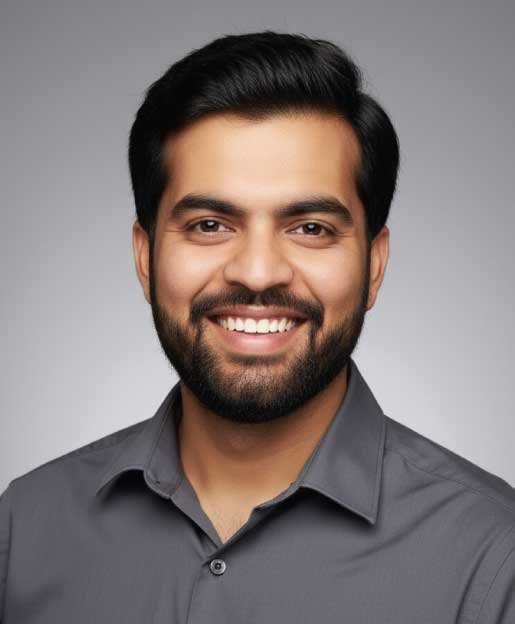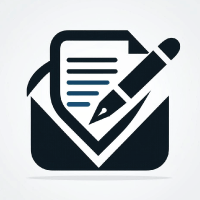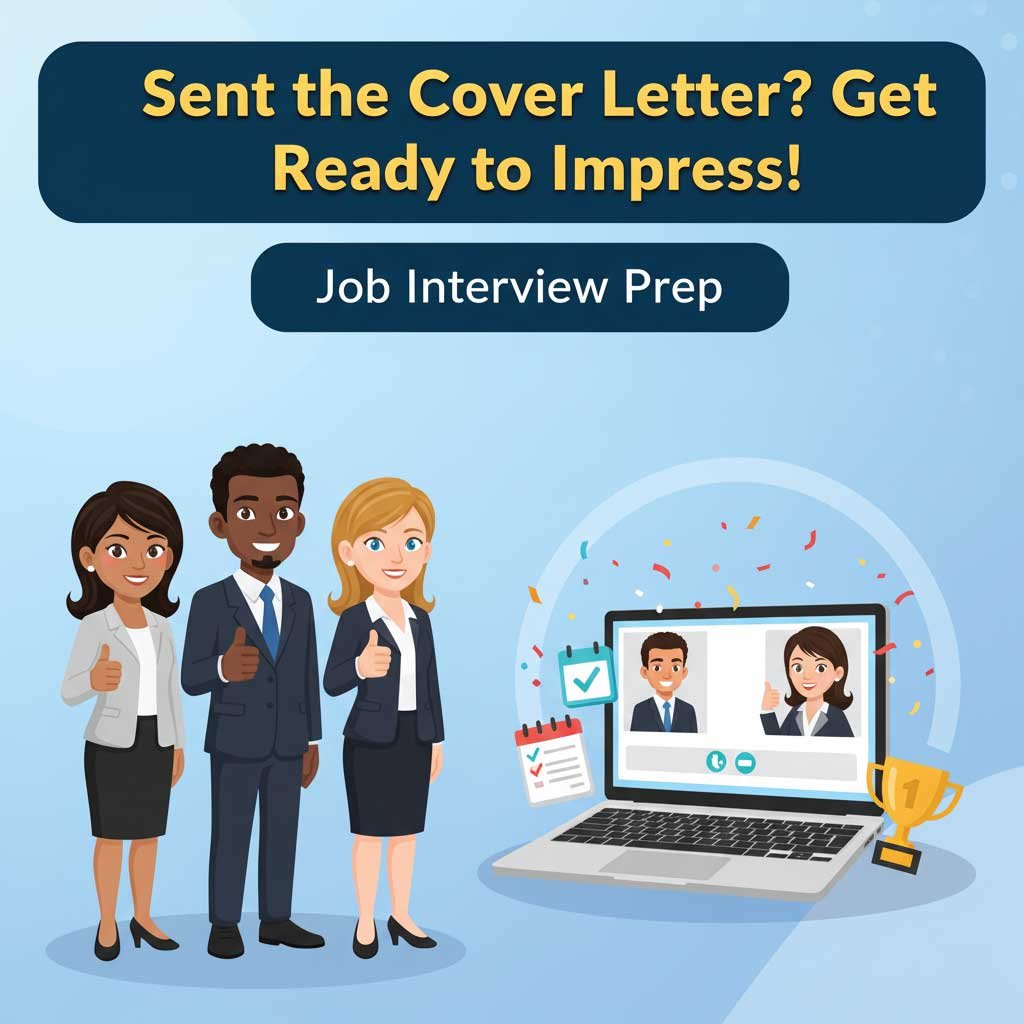You have done the first step — you crafted and sent that perfect cover letter. Now the waiting begins. The exciting (and sometimes nerve-racking) question that follows is: “What should I do next?”
Preparing for an interview does not start the moment you get the call; it starts right after you hit “send” on your cover letter. Those few days in between are your golden time to prepare smartly — so when the recruiter finally reaches out, you’re ready, confident, and calm.
Let’s walk through how to get ready like a pro — step by step.
1. Don’t Just Wait — Prepare Ahead
Most people make the mistake of thinking, “I’ll start preparing once they call me.” But smart candidates start early.
Even before you get that email or call, you can begin building your readiness quietly in the background.
Think about it like this — you wouldn’t go to an exam without studying first. So why wait until the last minute for something as important as your career?
💡 Here’s What to Do Right After Sending Your Cover Letter:
-
Save the Job Description: Download or copy the full job listing. Once it’s gone, you might not find it again. You’ll need it for your prep.
-
Review Your Cover Letter and Resume: Read what you wrote — you’ll be surprised how many candidates forget what they sent! Refreshing your memory helps you stay consistent.
-
Research the Company: Visit their website, social media pages, and news mentions. Get familiar with their goals, products, and culture.
-
Start Preparing Answers to Common Questions: Even if you don’t have an interview yet, knowing how to answer questions like “Tell me about yourself” or “Why do you want to work here?” puts you a step ahead.
The idea is simple — get ready quietly while others wait passively.
2. Study the Job Description Carefully
Your cover letter was your introduction. Now it’s time to turn that knowledge into interview confidence.
The job description is like a cheat sheet — it tells you exactly what the employer is looking for. Read it again, slowly, and underline key words like “teamwork,” “leadership,” “problem-solving,” or “attention to detail.”
Each of these words gives you a hint about what they might ask during the interview.
🧭 Example:
If the job post says:
“We’re looking for someone who can manage multiple tasks in a fast-paced environment.”
You can expect questions like:
-
“Tell me about a time you handled several responsibilities at once.”
-
“How do you stay organized when deadlines overlap?”
By identifying these clues early, you can prepare specific examples from your past experience that prove you’re capable.
✅ Quick Tip:
Keep a small notebook or digital note titled “Interview Prep.”
Write down 3 key skills from the job description and examples from your work or studies that show those skills in action.
This one small habit helps you sound thoughtful and confident later on.
3. Research the Company — Go Beyond the Basics
Most candidates visit the company website for two minutes, memorize the “About Us” section, and move on.
But employers can tell when you’ve only done surface-level research.
If you truly want to impress, dig deeper.
🔍 Here’s How to Do It Right:
-
Visit the company’s official website — note their mission, values, and recent updates.
-
Check their LinkedIn profile — see what kind of posts they share and what tone they use.
-
Look up their news articles — have they launched a new product, won an award, or partnered with someone? Mentioning that during an interview shows genuine interest.
-
Read employee reviews on platforms like Glassdoor — they often give insight into work culture, interview styles, and benefits.
Now, imagine how strong your impression will be when you say:
“I recently read that your company expanded to three new cities — that kind of growth really shows your commitment to innovation.”
That one sentence alone tells the interviewer — this person did their homework.
4. Practice How You’ll Introduce Yourself
The most common interview question — and often the hardest — is,
“Tell me about yourself.”
It sounds simple, but it sets the tone for the entire interview. Most people either ramble or give a boring summary of their resume.
The best answer is short, personal, and focused on your strengths.
🎯 Use This 3-Step Formula:
-
Start with your background:
“I graduated with a degree in Business Administration and started my career as a marketing assistant.” -
Highlight your experience:
“Over the past three years, I’ve worked on digital campaigns that increased client engagement by 40%.” -
Connect to the company:
“I’m excited about your company’s creative approach to marketing — I’d love to contribute my skills here.”
✅ Practice Tip:
Record yourself saying this out loud. Listening to your tone helps you sound more natural and confident.
5. Review Your Own Cover Letter
This might sound strange, but before your interview, read your own cover letter again carefully.
Why? Because the interviewer probably has it printed in front of them.
If you mentioned something like:
“I’m passionate about data analysis and love finding trends that improve performance,”
you can expect a follow-up question such as:
“Can you share an example of a trend you discovered that improved performance?”
That’s your moment to expand on what you wrote.
Make sure you remember every example, number, or achievement you included. If they ask about it, you’ll be ready.
6. Prepare Your Own Questions for the Interviewer
Many candidates freeze when the interviewer asks,
“Do you have any questions for us?”
But this is not just a formality — it’s your opportunity to stand out.
Having smart questions ready shows that you’re genuinely interested in the role and that you think like a professional.
💬 Great Questions to Ask:
-
“How do you define success for this position?”
-
“What does a typical day in this role look like?”
-
“Can you tell me more about the team I’d be working with?”
-
“What are some challenges your department is currently facing?”
Avoid questions about salary or benefits in the first interview. Keep it focused on learning and contribution — that’s what impresses hiring managers.
7. Prepare Mentally and Physically
Interviews aren’t just about what you say — they’re also about how you show up.
Confidence, calmness, and energy all matter.
Here’s how to prepare both mentally and physically:
🧠 Mental Prep:
-
Visualize success — imagine yourself walking in (or joining online), smiling, and answering clearly.
-
Practice deep breathing if you feel nervous.
-
Remind yourself — it’s a conversation, not an interrogation.
💪 Physical Prep:
-
Get a good night’s sleep the day before.
-
Drink water and eat something light before your interview.
-
Dress neatly (even for online interviews).
-
Check your camera, mic, and internet connection if it’s virtual.
When your body feels calm, your mind naturally performs better.
8. Follow Up Professionally
Once your interview is over, don’t just disappear. A polite follow-up can leave a lasting impression.
Wait for about 24 hours, then send a short thank-you email.
💌 Example:
Subject: Thank You for the Interview Opportunity
Dear [Interviewer’s Name],
Thank you for taking the time to meet with me today. I truly enjoyed learning more about the [Position Name] role and your team’s work at [Company Name].
I’m very excited about the possibility of contributing to your goals and would be thrilled to bring my skills to your organization.
Warm regards,
[Your Name]
A simple thank-you shows respect and professionalism — qualities every employer values.
By now, you’ve already learned how to prepare smartly right after submitting your cover letter — researching the company, reviewing your own letter, and practicing your introduction.
Now it’s time to take your preparation even deeper. These final steps will help you feel confident, calm, and ready on the day of your interview — whether it’s online or face-to-face.
9. Create a Personalized Interview Plan
Every interview is unique — even for the same job title.
That’s why you should make a personal plan instead of just memorizing general answers.
Take out your notebook (or open a note on your phone) and write down:
-
The company name
-
The job title
-
The skills they want most
-
3–4 examples from your life or career that match those skills
Now, turn each of those examples into short, clear stories.
🗣 Example:
If the job ad says “Strong teamwork skills required,” you can prepare like this:
“At my last job, our project team faced a tight deadline. I took the initiative to organize short daily meetings to track progress. That helped us finish two days early and reduced last-minute stress.”
This approach helps you sound confident without sounding rehearsed — because you’re sharing real experiences.
10. Practice with a Mock Interview
One of the best ways to prepare is by doing a mock interview — basically, a rehearsal of the real thing.
Ask a friend, family member, or mentor to play the interviewer.
Give them the job description and ask them to throw random questions your way.
🧩 Why This Helps:
-
You get comfortable saying answers out loud.
-
You identify where you pause or struggle.
-
You practice controlling nervous habits like saying “umm” or fidgeting.
If you don’t have someone to practice with, record yourself on your phone. Watch it afterward — notice your tone, posture, and how clear your answers sound.
You’ll often realize that you’re doing better than you think.
11. Prepare for Common Interview Questions
While every job is different, most interviews include a few universal questions.
Here are some of the most common ones — and how to approach them naturally:
🧠 “Tell me about yourself.”
Keep it short — talk about your experience, skills, and what excites you about the role.
💼 “Why do you want to work here?”
Mention something specific about the company — maybe their culture, product, or growth. Show that you’ve done your homework.
🧩 “What are your strengths?”
Pick 2–3 qualities that genuinely describe you. For example: “I’m organized, reliable, and love problem-solving.”
⚙️ “What are your weaknesses?”
Be honest but positive. Say something like:
“I sometimes take on too many tasks myself, but I’ve been learning to delegate better.”
🎯 “Where do you see yourself in 5 years?”
Show ambition, but stay realistic.
“I hope to grow within your company, take on new responsibilities, and contribute to long-term projects.”
Preparing thoughtful answers in advance helps you stay calm and confident when the real interview happens.
12. Learn to Manage Nervousness
Feeling anxious before an interview is completely normal. Even experienced professionals get nervous.
The trick is to manage that nervousness — not eliminate it completely.
🌬 Try This Quick Relaxation Routine:
-
Take a slow, deep breath for 4 seconds.
-
Hold it for 4 seconds.
-
Exhale gently for 4 seconds.
-
Repeat 3 times.
It sounds simple, but it instantly calms your body and clears your thoughts.
Also, remember: the interviewer wants you to succeed. They invited you because your cover letter impressed them. You’ve already passed the hardest step — getting noticed.
13. Focus on Body Language and Communication
Your body often speaks louder than your words.
Even if you give perfect answers, poor body language can send the wrong message.
Here’s how to look confident and professional:
👀 Eye Contact:
Maintain gentle eye contact. Don’t stare — just look at the interviewer while speaking and nod occasionally to show engagement.
💪 Posture:
Sit straight, but relaxed. Avoid slouching or crossing your arms — it makes you look defensive.
😀 Smile Naturally:
A warm smile instantly builds connection. It shows confidence and friendliness.
👐 Hand Gestures:
Use small, open hand gestures to emphasize your points. They make you appear more genuine and expressive.
If your interview is virtual, check your camera angle, lighting, and background.
A clean, bright setup makes a great impression even before you start talking.
14. Dress the Part
What you wear can silently communicate respect and professionalism.
Always dress slightly more formal than what’s expected for the role.
👔 For In-Person Interviews:
-
Choose neat, well-fitted clothes.
-
Keep colors simple — navy blue, black, white, or grey.
-
Avoid flashy jewelry or heavy perfume.
-
Make sure your shoes are clean and polished.
💻 For Online Interviews:
-
Dress as if you’re attending in person (at least from the waist up).
-
Avoid patterns or bright colors that distract on camera.
-
Sit in a quiet, well-lit room with no clutter behind you.
When you feel well-dressed, you automatically feel more confident.
15. Review Your Resume One More Time
A common mistake candidates make is forgetting what’s on their resume — especially if they’ve applied for multiple jobs.
Before your interview, take five minutes to read through your resume carefully.
Remember the details of each job, skill, or project you listed.
If the interviewer asks,
“Tell me more about your role at your last company,”
you’ll be able to answer smoothly — without hesitation.
Consistency between your cover letter, resume, and interview answers builds trust. Employers love candidates who know themselves well.
16. What to Avoid Before the Big Day
A few small mistakes can ruin a great interview.
Here’s what not to do before your big day:
🚫 Don’t stay up too late.
Sleep deprivation can make you forget details and sound dull.
🚫 Don’t rehearse too much.
Over-rehearsing can make your answers sound robotic. Stay natural.
🚫 Don’t complain about previous jobs.
Even if asked about challenges, always speak positively.
🚫 Don’t check your phone during the interview.
Keep it silent and out of sight — it’s basic respect.
🚫 Don’t forget to smile.
Even in virtual interviews, a small smile makes a big difference.
17. Pack or Prepare Everything You Need
If it’s an in-person interview, prepare your materials a day before:
-
2 copies of your resume
-
A copy of your cover letter
-
A pen and small notepad
-
Your ID or any documents requested
-
A bottle of water
For virtual interviews, prepare:
-
A stable internet connection
-
Your resume and notes open on your screen
-
A backup power source or charger nearby
-
Earphones with a clear microphone
Being prepared gives you peace of mind — you won’t be rushing last minute.
18. Create a Positive Mindset Before the Interview
The night before your interview, do something relaxing — take a walk, listen to music, or read something inspiring.
Avoid overthinking. Tell yourself:
“I’ve done my best. I’m ready. I just need to be myself.”
Confidence comes from preparation and peace of mind. When you combine both, you walk in (or log in) with genuine energy that interviewers remember.
19. After the Interview — Reflect and Learn
Once the interview is over, take a few minutes to write down what went well and what could improve.
Ask yourself:
-
Did I answer confidently?
-
Was there a question that surprised me?
-
How did my body language feel?
This small habit turns every interview — even rejections — into a learning experience that improves your next one.
20. Keep Moving Forward
Sometimes you’ll feel like you nailed it, yet you might not get the job. That’s okay.
Every interview adds a new layer of experience. You get better at understanding questions, managing nerves, and expressing yourself.
Remember: no effort is wasted. The more you prepare, the luckier you get.
Your next opportunity might just be around the corner — and you’ll be ready for it.
Final Thoughts — Confidence Grows with Preparation
After sending your cover letter, don’t just wait and hope — prepare and grow.
Every small step you take — from researching the company to practicing your answers — builds confidence that shines during the interview.
Remember: the interviewer isn’t looking for a perfect person. They’re looking for someone genuine, prepared, and willing to learn.
So take a deep breath, believe in yourself, and step into that room (or call) knowing you’ve done everything you can.
Your preparation speaks before your words do — and that’s what gets you hired. 🌟

I am Engineer Hassan Ch, a professional content creator with a strong focus on career development and effective writing. My expertise lies in crafting clear, impactful cover letters, templates, and writing guides that help job seekers stand out. I am passionate about creating authentic, easy-to-follow content that turns complex ideas into simple, practical steps for success.

